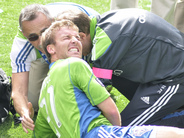 Maybe you no longer find playing your sport as fulfilling as it used to be. You think if you stopped playing altogether you would be better off. Perhaps you are feeling a bit slower, a bit older and wonder if it's time to hang up your cleats. Maybe you have been injured and are considering your return to play with some trepidation. You may think perhaps you should just stay away. There are myriad situations which may prompt an athlete to ask the ultimate question. The decision to stop playing your sport is a big one, and can be quite daunting to consider. You are fortunate that you have the option; many athletes have the proverbial rug pulled out from under them through career-ending injury or forced retirement as they are replaced by younger talent. It's never easy, but there are some questions you can ask yourself that might help to put everything in perspective. Once you can see more objectively, the decision to make will become clearer. Of course as an athlete the word "quit" is not in your lexicon. In making your decision, you need to understand "quit" is not what you are doing. If through much soul-searching and rational thought you decide to leave your sport, rest assured you are not "quitting." You are making a mature, informed decision that is best for you. Your responses to these questions should reveal your beliefs about yourself, your sport, and what is truly in your heart, head and gut on this matter. In typical Socratic fashion, follow-up questions will challenge those beliefs. What emerges is valuable dialogue that gets to the true heart of the matter. So what questions should you ask yourself to get started? Try these:
If injury prompted your decision-making, ask yourself:
Many of the issues or feelings you may be experiencing don't have to result in a black and white decision. Burnout, fear or anxiety, lack of confidence, all have a very real impact on how we feel about playing. But they can also be overcome using mental tools and focused effort on your part. A sport psychology consultant, for example, can teach you how to use these tools to help you regain confidence, to love the game again and to get back whatever it is you think you may have lost. The decision to stop playing, in most cases, is and should be yours alone. Sometimes talking it out with others can be helpful. Parents, family, coaches and friends are all great people to bounce your thoughts off of. Just be sure to take into consideration that the closer they are to you and the situation the more difficult it may be for them to step back from their own biases and perspective. Ultimately, though, your support system should want you to do what is best for you. If you choose to seek assistance, a professional can guide you through the questioning process and help you to put everything in perspective through an objective lens. So ask yourself the tough questions, see how you feel when you consider alternatives to sport, talk with others and seek professional support if you wish. And keep in mind that no decision is necessarily set in stone. What is right for you now might change in the future, and maybe you will decide to go in the other direction later. Just remember it's up to you.
0 Comments
 All the conditioning, practice drills and strategy sessions you engage in will prepare you for some tough competition. But they won't prepare you for the worst-case: injury. The possibility is always there but until it happens to you, it's not something you devote too much time or thought to. Suddenly you find yourself in a very different routine--doctor's visits, possible medical intervention or surgery, physical therapy. Your focus is on physical repair of the injured part, but don't forget there is more to the puzzle. What goes on in your mind when injury strikes needs just as much attention. The mind-body connection is vital when healing in the body needs to take place. The physical healing process following injury works in stages, and with each stage are psychological factors that should be recognized. The outcome of any sport injury rehabilitation (SIR) program is four-fold:
Briefly, consider there are three phases of SIR. Phase 1 begins at the onset of injury. Physically there is pain, swelling. Psychologically there is anxiety about the unknown--what did I hurt? How bad it it? Can we fix it? What needs to be done? Will I ever play again? Also you may feel a lot of negativity--responsibility or guilt for "letting it happen." "If I only I had done this instead of that." "I am letting my team down." Phase 2 is the longest phase, both physically and psychologically. It is when the rehab begins. Medical intervention (surgery, cast, brace, etc.) has been done and it is time to get strength and full range of motion back. Psychologically this is a tough time. There is anxiety that the process is taking too long, and motivation to do the necessary exercises decreases. There may be more negative self-talk. "I'm never going to feel better!" By the time Phase 3 arrives you are ready to actually practice sport-specific skills. You may return to play in a limited capacity, eventually fully able to play. In this phase, the anxiety takes the form of a lack of confidence, fear the injury may recur. Fear you may not play up to the level you were before. You may find yourself replaying the injury over and over in your head. You may be hesitant, tentative and possibly strain something else in your efforts to keep your newly mended part safe. Consider Washington Capitals forward Brooks Laich, who, after sitting out a frustrating season mending a groin injury, returned to the ice and promptly "tweaked" the other hip flexor. Likely he was a little hesitant and perhaps overcompensated, resulting in a new injury. You can see how the mind can throw obstacles in your path to full healthy recovery. The good news, however, is that if you pay attention, you can make your mind work for you, not against you. Go back to Phase 1. The anxiety and negativity exists because suddenly you are in a situation you are unfamiliar with, not in control of. You need to take control back, to educate yourself about exactly what happened. Work with your trainer/doctor/physical therapist. Ask lots of questions. Have them show you pictures of the injured area. See what yours looks like now, and what a healthy one should look like. Learn why they are choosing a particular course of action. Understand how and why their interventions work, each step of the way. This is not the time to be passive in your treatment. During Phase 2, it is vital that you stay motivated. The number one proven effective method for sustaining motivation is goal-setting. Either with your practitioner, coach, or on your own, set goals for your progress and ultimate return to play. Washington Redskins quarterback Robert Griffin III, when beginning his long road back from a knee injury, changed the passcode on his phone to the date of the first game of the next season, when he fully expected to be able to participate. Set long-term and short-term goals. Whenever you are feeling down or discouraged, engage in positive self-talk. Tell yourself you are constantly progressing. Make sure you have a support system of family, friends, coaches, and go to them for encouragement as often as you need. Imagine yourself strong and healthy again. If you are feeling isolated from the rest of the team, do what you can to stay part of the group. Attend practices whenever you can, even just to watch. Attend meetings or social gatherings. The point is to stay engaged. Once Phase 3 arrives, see yourself being successful. If (and when) the replay of your injury seems on endless loop, stop yourself and replace it. Make a new "highlight film" in your mind. One where you escape injury, make the right moves, emerge unscathed and victorious. Make a point of repeating this film over and over. SIR is never a one-size-fits-all process. There are often setbacks, curve balls. But if you can stay mentally strong and in control, you can handle anything. You will actually come out on the other side even stronger and more confident than you have ever been. Knowing that the possibility of injury is part of any sports endeavor doesn't have to keep you from fully performing. With a strong mind, you will defeat injury; it will not defeat you. Upcoming Articles:
Every athlete knows the risks. They also never really think it will happen to them. After all, that's why there are conditioning programs, strength training, warm-ups, stretching. But then there's a misstep, a big hit, an awkward move. Suddenly life as you know it takes a very strange turn. Beyond the x-rays, the treatment, surgery, and rehabilitation lies one more piece of the puzzle that is not always tended to--what changes are going on in your head.
You may attend practice while you heal, but can no longer participate. How does that make you feel? You see the player who is now filling your shoes and doing very well. What thoughts are going through your mind? When it is time for you to return, are you anxious? Scared? Many athletes experience new fears they never considered. They second guess every movement they make--will this hurt? Will I get hit too hard? Will I be able to play as well as I used to--ever? The ideal time to begin to address all of these is ideally as soon as treatment starts. It's important to be able to talk to someone about your concerns. It is also important to come up with ways to calm your fears. Relaxation to calm your mind, and using mental imagery and visualization to see yourself back in action are effective tools. Another is positive self-talk, reminding yourself of where you were and how far you've come, how strong you still are. Know that your skills, while they may be a bit rusty at first, are still there. They will return. All is not lost. Imagine yourself back in action. Really feel like you are there. Take in sights, sounds, the feel of being back. This may seem obvious but is important to note--when you are imagining, you are completely in control of your success. Always imagine yourself being successful! You perform flawlessly, at the top of your game. You can even visualize a situation similar to what caused your injury. This time, though, you escape injury. You catch yourself, move properly, avoid the hit. Feel your confidence grow with each scenario. These are just a few examples. There are so many techniques you can use. Choose what works best for you. With appropriate mental preparation, you should have very little trouble making your triumphant return. |
Articles for Athletes
Information to help you achieve your personal best performance! Archives
February 2016
Categories
All
|
